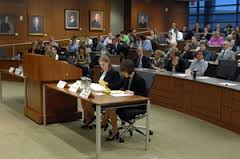Kill Your Darlings
Once upon a time, I wrote the most beautiful sentence. It was clever, nicely worded, and I loved looking at it. Each time I re-read it, I felt a surge of pride. “I know nothing in the world that has as much power as a word,” Emily Dickinson once wrote. “Sometimes I write one, and I look at it, until it begins to shine.” As I read my sentence for possibly the hundredth time, I understood what Emily was talking about. My sentence shone.
As I edited my memo, perhaps a week later, I gritted my teeth, took a deep breath, and reminded myself, Kill your darlings. I highlighted my beautiful sentence, and hit delete.
“Kill your darlings”: a bit of advice that is (or should be) given to aspiring writers everywhere, handed down like the word of God from experienced writers, professors, and editors. Attributed to any number of famous names, the original quote probably came from a series of Cambridge lectures by Arthur Quiller-Couch in the early 1900s, but its provenance isn’t the source of its popularity. Rather, it remains popular advice because it results, in almost every case, in better writing.
Legal writing and creative writing are very different beasts in many respects, and it may seem counter-intuitive to apply this bit of literary wisdom in the legal sphere. Creative writing, after all, concerns itself with things like characterization and plot and atmosphere. Legal writing is concerned with rules and logical analysis. And yet, just like the rules of grammar, the concept of killing your darlings remains sound.
Killing your darlings doesn’t just mean, as in the case of my poor sentence, eliminating turns of phrase that you’re particularly proud of. In legal analysis, your darlings may take the form of a bit of clever reasoning that actually does nothing to strengthen your overall argument, or a stylish word choice that ends up distracting a reader from your meaning. Killing your darlings is, in many ways, about sacrificing your personal taste on the altar of the reader.
As you read through your draft, pay particular attention to the portions of it that seem to shine, and look at them with a critical eye rather than a satisfied smile. Does it clarify your point? Does it flow with the rest of your writing, or does it stick out like a jagged rock in a stream? Is it flowery and slightly pretentious, like that terrible rock metaphor I just used? Are you struggling to make the rest of the sentence, paragraph, or section fit around it?
If your answer is yes, then it may be time to grit your teeth, take a deep breath, and hit delete. Your readers will thank you for it.


